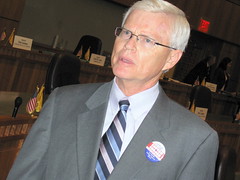March 10, 2011
 |
| A medical marijuana clinic and Botox clinic , Venice Beach, Calif. |
True, Susana Martinez, whenever asked by reporters, said during last year's gubernatorial campaign that she opposed the program, which the state adopted in 2009 as a way for people suffering from certain maladies to make medicinal use of the drug. But not long after her inauguration, Martinez made it clear that repealing medical marijuana was not high on her list of priorities.
Some activists became concerned last month, however, when freshman Rep. Jim Smith, R-Sandia Park, introduced House Bill 593, designed to shut down the program. Was there a chance the Legislature might really do it?
No, there wasn't. And by early this week, Smith himself realized it. He issued a news release Tuesday saying as much, and on Wednesday, he confirmed to me that he'd ask to pull the bill, which had been scheduled for a committee hearing this weekend.
"I've spent time talking to (Rep.) Moe Maestas," Smith said, referring to the Albuquerque Democrat who in the past has carried medical-marijuana bills. He also said he'd talked with activists who back the program.
"I think there needs to be more information about the program," Smith said. "We really need to study it and get all the information available."
So instead of HB 593, Smith will be pushing House Memorial 53, which he introduced this week. The memorial calls for the state Health Department to make a report on the program this year after the session is over.
 |
| Rep. Jim Smith |
The study would consider "new developments in the field of medicine, appropriate age ranges for treatment of debilitating conditions with medical marijuana, the legal status of the unresolved conflicts between state and federal law, whether the use of marijuana for medical purposes has resulted in any increased criminal activity," among other points.
The proposed study, which would be submitted to an interim legislative committee by October, also would look at "unresolved issues, problems and benefits and whether continuation of the program is justified."
Smith emphasized that he wants to hear from all sides of the issue. And he stressed, "I'm not advocating that any medicine be taken away from people who need it."
Emily Kaltenbach, state director of the Drug Policy Alliance — which led the effort to establish the state's medical-marijuana program — said she looks forward to the study and interim committee hearings. "We look forward to having that dialogue, sharing information and educating during the interim."
She said the study should include input from patients in the program: "We could make this a meaningful study."
The bill has been assigned to the House Consumer & Public Affairs Committee as well as the House Appropriations Committee.
Mardi Gras surprise: People attending a couple of recent Democratic fundraisers probably were shocked to see one face in the crowd: State Sen. Rod Adair, R-Roswell.
Adair, one of the most conservative lawmakers in the Roundhouse, confirmed Wednesday that he was given a ticket — valued at $100 — for a recent state Democratic fundraising dinner. Later, a Democratic friend gave him a ticket — valued at $40 — for a Santa Fe County Democratic Party Mardis Gras celebration Tuesday.
The senator stressed that he didn't purchase either ticket.
"They had Cajun food," Adair said. "I had a good dinner and a good time."
He said he enjoyed talking with Santa Fe District Attorney Angela "Spence" Pacheco, who supported Adair's SB 96 to fund a system to warn crime victims when offenders are released from prison. The bill passed the Senate this week.










